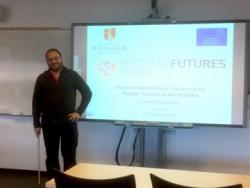Newsletters
Dr. Simon Middleburgh gives a seminar on Nuclear Futures at Bangor University
On the 2nd October 2019 Dr Simon Middleburgh (Bangor University) gave a research seminar on the Nuclear Futures Bangor research group and the growth and need for low CO2 nuclear power in Wales and the UK. The group has rapidly grown since its inception in early 2018, established with funding from the Welsh Government’s Sêr Cymru programme and industry funding focused on developing safe next generation nuclear power (including nuclear fusion). The group has a core set of materials scientists/engineers and physicists focusing on modelling and experiments targeted at solving significant challenges within the nuclear industry.
 Dr. Simon Middleburgh presenting his seminar on Nuclear Futures Bangor Simon introduced the talk by presenting general information about the nuclear energy industry and how nuclear represents a cleaner, more abundant fuel source compared to many other renewable and low-CO2 options. He presented the people within the group and their various sets of expertise as well as the facilities that have been grown in Bangor dedicated to nuclear material manufacture and characterisation. He also highlighted the link with the Nuclear Energy Futures - Centre for Doctorial Training (CDT) , a collaboration between Imperial College London, the University of Bristol, the Open University and the University of Cambridge, where they have two new PhD students partnered with industry. Simon then briefly presented three research projects (1) looking at accident tolerant fuel cladding research (Ms. Megan Owen’s Ph.D. project) (2) working with enhanced nuclear fuel concepts (Mr. Fabio Martini’s Ph.D. project) and (3) understanding and improving the behaviour of structural materials designed for fusion reactors (being led by Dr. Iuliia Ipatova within the Nuclear Futures Bangor group).
Dr. Simon Middleburgh presenting his seminar on Nuclear Futures Bangor Simon introduced the talk by presenting general information about the nuclear energy industry and how nuclear represents a cleaner, more abundant fuel source compared to many other renewable and low-CO2 options. He presented the people within the group and their various sets of expertise as well as the facilities that have been grown in Bangor dedicated to nuclear material manufacture and characterisation. He also highlighted the link with the Nuclear Energy Futures - Centre for Doctorial Training (CDT) , a collaboration between Imperial College London, the University of Bristol, the Open University and the University of Cambridge, where they have two new PhD students partnered with industry. Simon then briefly presented three research projects (1) looking at accident tolerant fuel cladding research (Ms. Megan Owen’s Ph.D. project) (2) working with enhanced nuclear fuel concepts (Mr. Fabio Martini’s Ph.D. project) and (3) understanding and improving the behaviour of structural materials designed for fusion reactors (being led by Dr. Iuliia Ipatova within the Nuclear Futures Bangor group).
Dr Simon Middleburgh said “It was excellent to present information about the Nuclear Futures group in the School Seminar. There are many exciting energy projects in North Wales, including nuclear power, wind and tidal projects. The future links with co-generation (hydrogen and recycling) and medical isotopes will ensure that nuclear technology will play a key role in the region’s economy and international standing. I am delighted to be part of the Nuclear Futures Bangor group, and want to collaborate with all of the other excellent researchers in the region and beyond”.
Publication date: 7 October 2019
